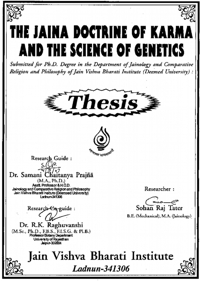Mithyātva (False Belief)
False belief or delusion - mithyā - wrong, tva = ness i.e. mithyātva = wrongness. It means wrong attitude, wrong taste, innoble activity such as not having a taste for and faith in the tatva (basic elements of Jainism) as mentioned by the omniscient ones. This is mithyātva. Mithyātva also means not having interest and faith in the path of mokṣa expounded by Tīrthañkaras but having interest and faith in the so called path of mokṣa expounded by ignorant and unenlightened people. In other words instead of having faith in true God, true spiritual head and true dharma, having faith in false God, false spiritual head and false dharma is mithyātva.
(i) Kudeva (false God)
The false God is he who possesses such demerits as attachment, hatred, desire, anger, miserliness, ridiculing, propensity, fear, ignorance etc.
(ii) Kuguru (false teacher)
False teacher (kuguru) is he who does not practice five great vows (non-violence, truthfulness, non-stealing, celibacy and non-possessiveness) who keeps with him wealth and women, makes others keep them, approves such actions, who uses and touches unboiled water, fire and vegetation, who cooks food, who asks specifically for the food to be cooked for him, and who approves the coking of food. Such a person is a false spiritual head.
(iii) Kudharama (false religion)
The false dharma is that which is devoid of a samyag darśana (the right faith) samyag jñāna (the right knowledge) and samyag cāritra (the right character or conduct) which does not explain the real nature of jīva (soul) and ajīva (non-living substances) and which deems it right to enjoy sensual pleasure to have passions and to commit sins.
Having faith in such false God, false spiritual head, and false dharma, having partiality for them and interest in them, constitute the false belief or mithyātva.
The five kinds of mithyātva are as follows: [5]
(I) Abhigrahika mithyātva (Absolutist or fantasic false faith)
This state involves one sided attribute, one sided view sticking to a false belief like there is no soul, no karma or killing inferior living beings is acceptable. This means having fanatic faith and interest in false dharma. Believing fanatically that his/her dharma alone is right and does not accept the true dharma expounded by the omniscient ones (Tīrthañkaras). Such persons may not know what is right belief.
(II) Abhiniveśika mithyātva (preserve or prejudicial faith)
This involves intentionally sticking to a wrong belief or not accepting the right belief. For example monks can have money. Monks can have women. God will be pleased if I sacrifice certain things. This also includes that one may have attained the right dharma but he/she may not believe some of its doctrines and may have prejudicial partially and believe in contrary doctrines.
(III) Saṁśyika mithyātva (skepticism)
In this state one becomes doubtful or skeptical about the dharma expounded by the omniscient ones. This person just cannot decide what is right and what is wrong.
(IV) Anābhigrāhika mithyātva (Egalitarian - faith in false dharma)
In this case one may believe that "this belief is right" and then he/she will change his/her mind that "that belief is right". He may believe that all religions are true even though they are contradicting. He/she has a non-discriminatory attitude. He/she thinks that all religions are equal and acceptable.
(V) Anābhogika mithyātva (Agnostic, total ignorance, lack of knowledge)
In this state, one cannot distinguish between the right doctrines and false doctrines and cannot have any knowledge or understanding of them. In this state, he/she does not know that living beings with less than five senses, and with five senses but without mind have an equal soul as we have.[6]
Mithyātva (false belief) is the greatest enemy of the soul. Because of this mithyātva, one has no faith in tatvas (basic elements of Jainism) the path of mokṣa, Tīrthañkaras, true spiritual heads and true dharma, and such person will involve in the sinful activities like violence and in sensual pleasures. As a result of this, persons go far away from the true dharma. All the sacrifices and austerities carried out through various lives become wasted became of his/her on going sinful activities and sensual enjoyments. We should discard mithyātva which is the basic cause of our misery, and we should embrace true God, true teacher and true religion (dharma). Till mithyātva is there all other four reasons remain simultaneously, it is their agreement.
 Prof. Dr. Sohan Raj Tater
Prof. Dr. Sohan Raj Tater
 Doctoral Thesis, JVBU
Doctoral Thesis, JVBU